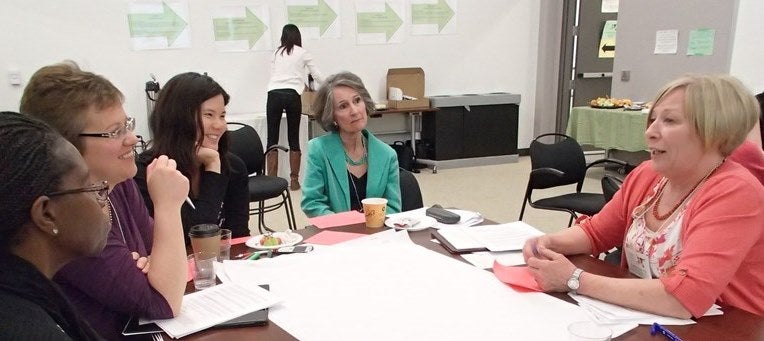
Appreciative Interviews at the Appreciative Inquiry retreat day: Asking questions that lead to great stories!
During our April Appreciative Inquiry retreat day, we invited story-teller Annette Simmons to speak to us about the power of story-telling. Annette taught us that storytelling helps us to see subjective truths as well as objective truths and, in so doing, helps us to connect people to the process of culture change in a stronger more meaningful way.
Lessons for the PiDC Alliance?
Upon reflection, we thought about how Annette’s lessons might be applied to the PiDC Alliance’s culture change journey towards relationship-centred care. Below are three important lessons we took from Annette:
1) Stories are accessible: Anyone can tell a story, and people are happy to listen to stories. When we share diverse experiences through story-telling in our Dawn phase, we learn about the value of each person’s experience, role and perspective. Simply, stories help to build authentic partnerships.
2) Stories help us to process change and get inspired by bold ideas: Culture change is a complex process. It asks us to re-consider traditional problem-solving processes which often leave people feeling blamed or isolated. People who feel this way can be resistant to change.
We learned that when we use story-telling in our work, we provide an avenue for participants to share their most profound experiences of relationship-centred care. -- Darla Fortune, post-doctoral fellow.
Through story-telling, participants come to their own conclusions about the potential for positive change and then analyse these stories in a way that focuses on already existing strengths and avoids feelings of blame.
Stories are powerful, because they can work to inspire others to imagine an ideal care future in the Dream phase of the Appreciative Inquiry journey. When we share a story, the listener draws her or his own conclusions and lessons, and has, with that story, a powerful tool to share those lessons more broadly in language that is comfortable, non-threatening and accessible.
3) Sharing stories, and gathering stories spreads the message of culture change widely:
Stories resonate. We find meaning in stories and learn from them differently than we do from top-down directives or lectures that include slide after slide of factoids and figures. Culture change is sometimes thought to be difficult to measure, but if we create a space in which people are rewarded for doing the work of culture change and sharing their stories of culture change, we might inspire many more to join the culture change movement.